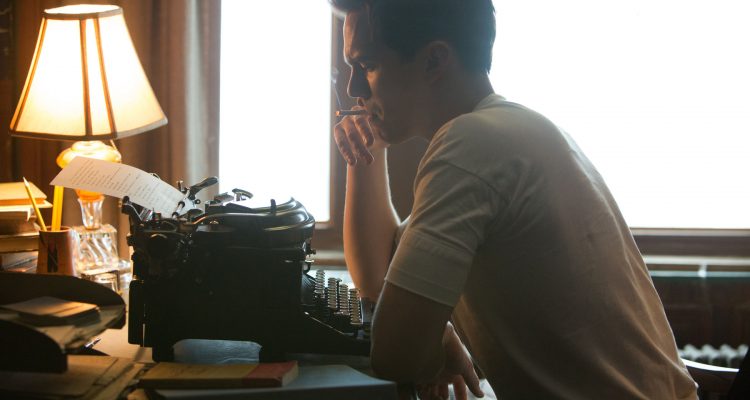PARK CITY — Danny Strong is a two-time Emmy-winning screenwriter who wrote “Game Change,” “Recount” and “Lee Daniels’ The Butler.” He also co-created a little series you might have heard of called “Empire.” Tackling the life of one of America’s greatest literary voices might have been a bit much for his directorial debut. That’s the thought that starts to percolate through your mind as you sit through the J.D. Salinger biopic “Rebel In The Rye,” which had its world premiere Tuesday night at the 2017 Sundance Film Festival.
READ MORE: The 30 Breakout Performers & Filmmakers Of The 2017 Sundance Film Festival
Based on Kenneth Slawenski’s 2010 biography “J.D. Salinger: A Life,” ‘Rebel’ chronicles all the key moments in the author’s life. A struggling young writer (Nicholas Hoult) in the late 1930s, Salinger falls for Eugene O’Neill’s daughter, Oona (Zoey Deutch, barely there), who ends up stringing him along for years. After getting kicked out of a number of universities (including NYU), he enrolls at Columbia, where he bonds with Whit Burnett (Kevin Spacey, enjoying the witty banter), a creative-writing professor and publisher of Story, a respected short-story magazine. He enlists in World War II and sees atrocities that haunt him and give him PTSD that he’s told will go away (it won’t). Upon returning to New York with an unexpected wife in tow (Anna Bullard, in literally one scene), he finally writes the long-form novel Burnett had been pushing him to put to paper. Most publishers reject it, but thanks to his literary agent Dorothy Olding (Sarah Paulson, of which, more please), Little, Brown and Company take a chance on his voice, and “The Catcher In The Rye” becomes a critical and commercial sensation. Unable to deal with his post-war nightmares and the stress of his newfound celebrity, he studies Zen Buddhism and Hinduism, connecting with a teacher, Swami Nikhilananda (Bernard White). Overwhelmed by the public reaction and stalking fans, Salinger moves to New Hampshire, where he buys a secluded home and turns an adjoining cabin into his private writing space. His new wife (Lucy Boynton) is increasingly frustrated raising their two kids in this isolated existence, and he disappears into his office writing for days at a time.
There are end cards.
Strong consolidates all of this into two storylines that are supposed to be the source of the film’s narrative conflict. First is whether Salinger will forgive Burnett for not publishing an anthology of his stories after the war and before ‘Catcher’’s success; and, second, whether he’ll find happiness as a writer with the increasing pressure to publish more material. One comes to a resolution. The other? History may never know the answer. Needless to say, ‘Rebel’ can only keep your interest for so long, and that might have more to do with Spacey and Paulson than anything else.
READ MORE: The Sundance Film Festival’s 20 Biggest Oscar Success Stories
Hoult has been impressive in films such as “Mad Max: Fury Road” and “Warm Bodies,” but those who find many of his other performances stilted have another example for their argument here. It’s a superficial, predictable performance that often features Hoult starring blankly into space. He’s admittedly pretty to look at with those dreamboat eyes, but there seems to be no vision in his portrayal outside of a few angry and bitter moments that often feel forced and overwrought. Frankly, this Salinger would be a massive bore to anyone who met him.
The worst aspect of ‘Rebel’ is that Strong seems to have no vision as a filmmaker. The movie thinks it’s throwing in some wise words about the art of writing, but they are superficial at best. Strong spends some time on Salinger’s religious explorations, but not enough to leave the audience with any sense of what it truly meant to him or his work. It all feels like a watered-down version of Salinger’s life.
Clearly, this was not ideal material for Strong’s feature directorial debut, but depending on your aesthetic, he deserves some credit for recruiting a crew that makes the final product look more slick and expensive than most independent productions. And that’s probably a bonus when you’re telling a Cliff Notes version of a historical figure’s unique life. [C-]
Click here for our complete coverage from the 2017 Sundance Film Festival


